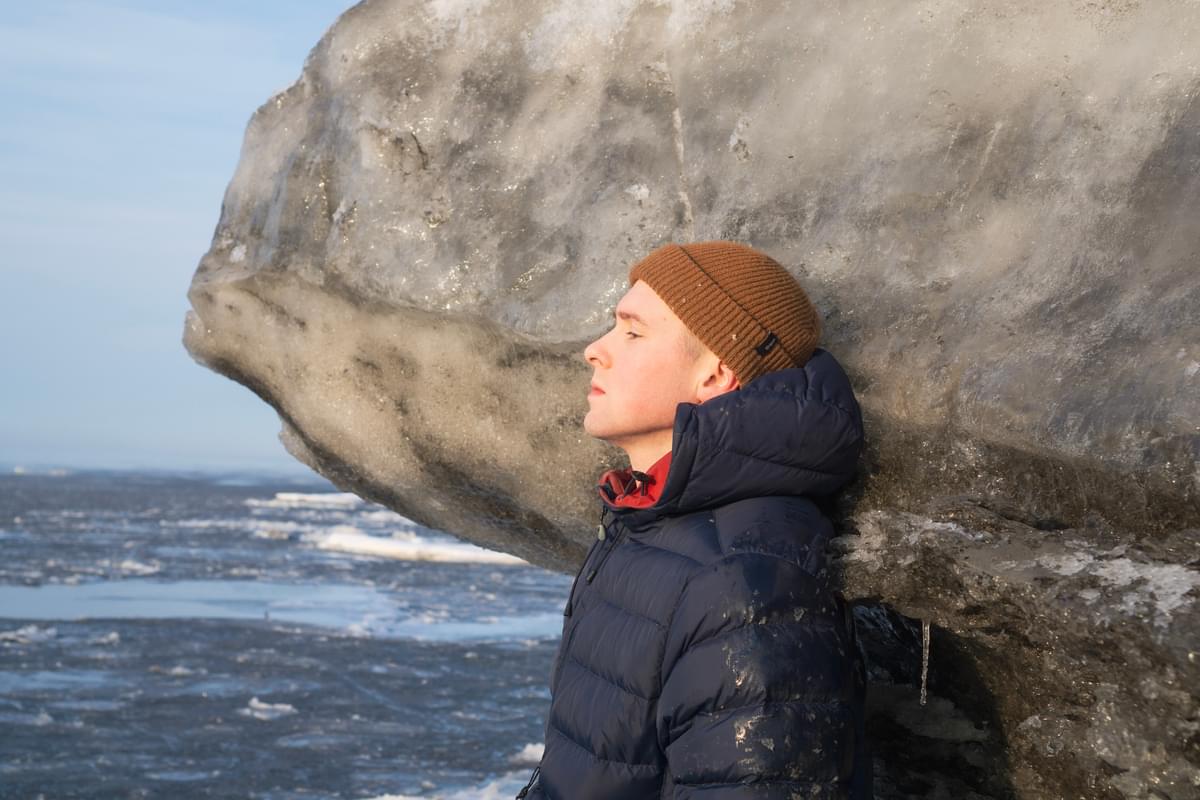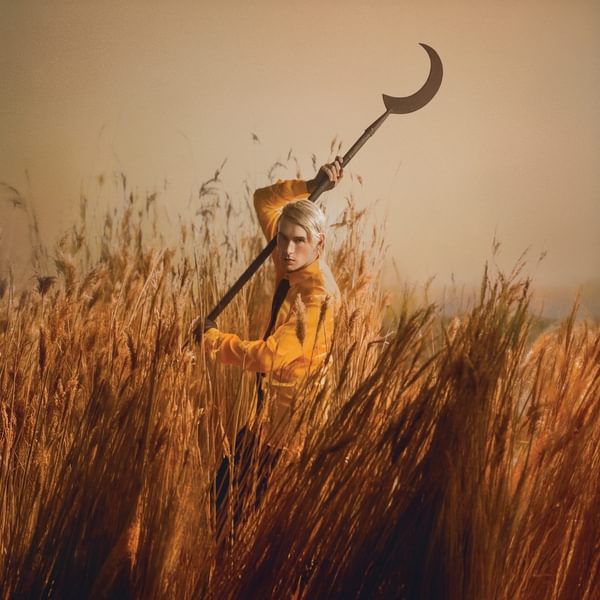
Nelson Kempf stumbles upon serenity in the extremes of emotion
“Oh man, it was crazy.” Nelson Kempf is explaining the complicated genesis of his debut album, Family Dollar. Serene to the point of abstraction, it dispenses with conventional narrative and song structure in favour of an ecstatic flow of images.
Marimba and harp lend a Reichian warmth to an expansive, electronic portrait of a particular kind of American poverty, exploring a deep connection to the landscape. It’s in sympathy with English electronic pastoralists such as Talk Talk or David Sylvian, but with a distinct sense of the great American songbook shredded and fed through the autotuner, all with a distinctly blue-collar sensibility that taps into folk, soul and minimalism.
“I think this comes back to the soundscape kind of thing. Up on the Slope in the winter, it’s dark all the time. The sun doesn’t come up, period. It’ll be negative 80 degrees Fahrenheit, you know? Really fucking cold. Then you’d come back to Tennessee and it’s 100 degrees Fahrenheit. And it’s extremely dry up there, obviously again the opposite. So stepping off the plane either way just punches you in the face.”
About ten years ago, Kempf had been starting out on a career in music and enjoying some modest success with his band The Old Believers. A couple of EPs had come out and they’d had some fun tours with The Decemberists and Laura Viers, but with the arrival of his first child, he needed money quickly. Originally hailing from Alaska, Kempf knew a lot of people in the petroleum industry and found work as a welder on the oil fields of the North Slope.
He then fell into what sounds like quite a weird existence, travelling between his family in Nashville and his job in the Arctic Circle. Three solid weeks working 12 to 16 hour shifts in one of the harshest and unforgiving landscapes on Earth, followed by three weeks to recover in the sweltering, sensory overload of subtropical Tennessee. He never exactly stopped making music, but between the demands of his job and the pressure of family life - foreclosure notices, utility shutdowns, illness, isolation and trauma - he could never find the focus or the wherewithal to get anything finished and out.

"It’s lush,” he says, “the natural world there is quite incredible. It’s so noisy, the cicadas and the crickets are so loud you can barely hear your own thoughts and there’s fireflies everywhere, snakes in the rivers and it’s just really hot and humid and lush. It feels very much like a sort of magical jungle.”
“But then it also has this horrid history, you know, which is still very, very apparent. So I guess it’s this pressure cooker-like feeling of being under constant physical attack from stress and looking around at the world that you live in, you know? I think when you’re in that place, you’re susceptible to being overwhelmed by the world, and in a weird way, you have a different openness that maybe you don’t always have.”
The album opener “Sweetness and Strife”, begins with an image of movement. There are tears and boxes being packed, blinding sunlight on a car windscreen, a glimpse of a business man pumping gas into his Beamer. It’s presented without comment, but we presume it’s the same gas that Kempf is leaving town to go and drill out of the ground.
There’s a sense of everything happening everywhere at once and a pervasive atmosphere of trauma - we know, as does Kempf, that for his family to survive in the short term he’s going to leave them to work in an industry that will leave our biosphere unliveable. But what else is there? If you’re listening to the album or reading this article, then you do so on a device that is powered by something. The record feels shot through with these moments of blinding epiphany, everything simultaneously frozen and rank with the same cloying humidity.
“I’m glad that’s a thing that’s observable. I wanted to present raw information. I guess that was part of the allergy I developed to traditional songwriting. I think when people write songs, they’re interpreting information, you know? They’re trying to present a message. That’s almost the point of songwriting. But I got it into my head that those messages are often inadequate," he says. “We don’t understand this life, we don’t understand this stuff, and we build these narratives in our heads. I really wanted to try and not interpret the information, not, at all cost, avoid it.”
A stand-out moment is “Dream of Life”, more of a delirious prayer than a song, and one which finds Kempf bedded down on a hospital floor, watching the streetlights stream through the windows and across the walls. He isn’t keen to be specific about what he calls “the dark stuff”, but on the macro level, within the world of the album, the extreme emotional polarity of the two landscapes manifest themselves as metaphor for life at the sharp end of the Anthropocene.
“I wanted to try and capture that on an acute level. I think when money becomes an issue, or maybe illness in the family - for this album specifically, I wanna talk about the money aspect because that kind of stress just pounds and manifests in these hyper-physical kinds of ways. I think it’s really hard to see that and understand it and if you can’t understand it then you can’t empathise, you know?”
Many of the lyrics were written on the fly. He would jot things down on his iPhone as they happened and this confessional, journal-like quality lends his words an uncanny kind of hyper-specificity. “There’s these points, sort of beautiful, clear points, in the extremes of emotion. Not in everyday experience, but in those emotional moments that exist in the extremes of everyday experience. I think they get ignored,” he says.
When Kempf’s making music, he’s thinking about natural images, and mostly he doesn’t write in the studio. Being out walking or working ties up the parts of his brain that need to be busy doing something else.
"I think about Björk a lot,” he says, “In terms of how important the texture of the sound, the arrangement, and the actual timbre of her music is to the overall picture. A lot of music out there doesn’t really consider that, or if it does consider it, then it’s in a very weird, separate way.”
“Like, people who are making folk music have an acoustic guitar, and they strum it, and no matter what happens in the context of the song, it’s still gonna be an acoustic guitar accompanying it. And I’m not saying that there’s anything wrong with that, but I feel like Björk is trying to paint a picture with the sounds. The sounds are gonna change on everything. For her, I also relate to it because she’s often talking about a sort of rigid Arctic environment. You can hear, or you can almost see or feel Iceland in her music.”
The recording of Family Dollar included a trip to Portland, Oregon for improvised sessions with marimba player, Dennis Piles, and harpist, Kimberly Houser. Obsessed with the idea of sensitivity to the unmediated resonances of nature, Kempf had some filmmaker friends create silent films of flowing ocean currents and zoomed-in images of leaves blowing, and instructed the musicians to play what they saw - to act as a kind of musical seismograph for natural movements of the world.
“It was like, let’s get to this, let’s get this down into this marimba track somehow, and luckily I had some very open minded musicians, you know? I’ve worked with a lot of musicians over the years and I think most of them would be like what the fuck are you talking about? What chord progression do I need here?”
A key moment for Kempf was his discovery of contemporary dance. His friend Banning Bouldin is a Juilliard trained dancer and Nashville native who toured the world with some of the most renowned dance companies. Returning to her hometown, Bouldin set up her own dance company, New Dialect, to give something back to her community and attracted dancers and choreographers from all over the world to work there.
“There’s all these really cool approaches and experimental methods and it’s very free and even the language of dance just appealed to me a whole lot more than the language of music.”

It was this perhaps more than anything that freed him from the frustration he’d experienced with the poppier material he’d attempted in the past. Once the family had sold the house in Tennessee and moved up north, he felt as if he’d caught some inspiration from the approaches he’d discovered via Bouldin. It wasn’t even necessarily experimental - Kempf admits that Family Dollar finally came out being a lot closer to that earlier, "straight-ahead" songwriting than he had intended - but there was finally a window of time and he felt that he knew what he wanted and needed and had the tools to go and make it.
It’s ironic, I tell him. There you are in Nashville, a musician and songwriter at the holy centre of American folk music, and you have to leave to make your album. “That’s true,” he laughs, “I hadn’t thought about that.” I wonder aloud if the sudden discovery of Merce Cunningham in such a place doesn’t betray a man who is already getting rather bored of the daily grind of Nashville. He stresses again that he’s by no means against any of it, but that it was just no longer fruitful for him.
We finish up talking about the musical traditions of local Alaskan Dena’ina people. “They have a really cool musical tradition that’s very functional in a way that I find really refreshing. I think a lot of music that we make is sort of frivolous, you know? Their music is purposeful. Inuit music and dance is to access the spirit world, to commune with relatives and animals. Whether or not that actually happens, like who cares? I love the idea of music with utility, even if the utility is an illusion.”
Listening to the album makes me wonder if these kinds of experiences are as illusory as all that. At the midpoint of the record, the chorus of “Dream of Life” breaks its bonds and spills over into the next song. Life, he seems to say, really is a dream, in the sense that we don’t see it as it is. We see it in either very specific, or very general ways, neither of which are complete.
Family Dollar isn’t just a record shot through with American folk music’s articulation of the pain of poverty and loneliness. It also sits in a fine lineage of essentially electronic music that dares to engage with the natural world, overturning both the usual conventions of the form, and with them our supposedly human point of view.
Get the Best Fit take on the week in music direct to your inbox every Friday

Patrick Wolf
Crying The Neck







